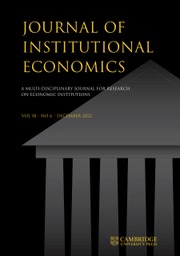-
- You have access: full
- Open access
Elinor Ostrom Prize
A prize of £1000 is awarded each year for the best full-length article published in the Journal of Institutional Economics in the preceding calendar year.
Each annual prize competition will be judged by an international committee of experts in the field of institutional research. The award is funded by Millennium Economics Ltd. Approval to use the Ostrom name has been obtained from the Indiana University Foundation.
For more information including shortlisted articles and prize committee members, visit the JOIE prizes and awards page.
2024 Elinor Ostrom Prize - Announcement
Jon Murphy (2023), “Cascading Expert Failure“, JOIE 19(1): 52-69.
The prize award has been increased to £1500.
2023 Elinor Ostrom Prize - Announcement
Adam Crepelle, Tate Fegley, Ilia Murtazashvili & Jennifer Brick Murtazashvili, “Community Policing on American Indian Reservations: A Preliminary Investigation”, JOIE 18(5): 843-860.
2022 Elinor Ostrom Prize - Announcement
Peter Grajzl “A Machine-Learning History of English Caselaw and Legal Ideas Prior to the Industrial Revolution I: Generating and Interpreting the Estimates", JOIE 17(1): 1-19
Peter Murrell “A Machine-Learning History of English Caselaw and Legal Ideas Prior to the Industrial Revolution II: Applications“, JOIE 17(2): 201-216
2021 Elinor Ostrom Prize - Announcement
Abigail Devereaux and Linan Peng, “Give Us a Little Social Credit: To Design or To Discover Personal Ratings in the Era of Big Data", JOIE 16(3): 369-387.
David Ciepley, “The Anglo-American Misconception of Stockholders as ‘Owners’ and ‘Members’: Its Origins and Consequences”, JOIE 16(5): 623-642.
The award was announced on 7 August 2021, on Elinor Ostrom's birthday.
Elinor Ostrom Prize - Winner 2020
Congratulations to Elise Brezis and Joël Cariolle for winning the 2020 Ostrom Prize for their article “The revolving door, state connections, & inequality of influence in the financial sector” published in Volume 15, Issue 4 of Journal of Institutional Economics.
Elinor Ostrom Prize - Winners 2019
Robbert Maseland, “Is Colonialism History? The Declining Impact of Colonial Legacies on African Institutional and Economic Development”, JOIE 14(2): 258-287.
Colin Harris, “Institutional Solutions to Free-Riding in Peer-to-Peer Networks: A Case Study of Online Pirate Communities”, JOIE 14(5): 901-924.
Elinor Ostrom Prize - Winner 2018
Avner Greif and Joel Mokyr, “Cognitive Rules, Institutions and Economic Growth: Douglass North and Beyond”, JOIE 13(1): 25-52.
Elinor Ostrom Prize - Winner 2017
Agnès Labrousse, “Not By Technique Alone: A Methodological Comparison of Development Analysis with Esther Duflo and Elinor Ostrom”, JOIE 12(2): 277-303.
Elinor Ostrom Prize - Winner 2016
Roger Koppl, Stuart Kauffman, Teppo Felin, and Giuseppe Longo (2015), “Economics for a Creative World", JOIE 11(1): 1-31.
Elinor Ostrom Prize - Winner 2015
Daniel H. Cole, Graham Epstein and Michael McGinnis (2014), “Digging Deeper into Hardin’s Pasture: The Complex Institutional Structure of the ‘Tragedy of the Commons’", JOIE 10(3): 353-369.
Inaugural 2014 Elinor Ostrom Prize - Winner
Fabio Landini, "Institutional Change and Information Production", JOIE 9(3): 257-284.
- ISSN: 1744-1374 (Print), 1744-1382 (Online)
- Frequency: 1 volume per year
Institutions are the stuff of social and economic life. The importance of understanding the role of institutions in economic growth is now widely appreciated. The Journal of Institutional Economics is devoted to the study of the nature, role and evolution of institutions in the economy, including firms, states, markets, money, households and other vital institutions and organisations. It welcomes contributions by all disciplines and schools of thought that can contribute to our understanding of the features, development and functions of real world economic institutions and organisations.
The Journal of Institutional Economics is a multi-disciplinary, fully Gold Open Access journal that is of interest to all academics working in the social sciences, management and law. Contributions from politics, sociology, geography, history, anthropology, psychology, law and philosophy are welcomed. The Journal of Institutional Economics aims to provide all authors with an expert verdict on their articles within fifty days of submission.

